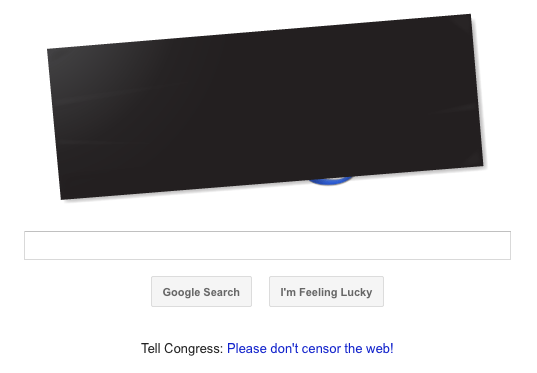SOPA blackouts just might kill the bill
This past Wednesday, the world went dark. Quiet. Well, part of it anyway. If you’re reading this article I’m going to assume you visited at least one of the 115,000 websites that had made alterations to their frontpages in a “blackout” protest against the Stop Online Piracy Act. For Wikipedia, it meant displaying a mostly black page with the Wikipedia logo and an explanation of the ramifications of the bill. While some sites went for similar service-outages, others made small changes to raise awareness. Google simply put a big black box over the logo on its homepage. Participation hit every corner of the web, from content aggregators like Reddit to the porn networks. It seemed like everyone was opposed to the bill, even if just for a day. I thought it must be a fluke.
It wasn’t. Millions of people signed an anti-SOPA petition that Google had put together, and that was just one petition. Several sites held similar petitions and email drives, all of which reported hugely successful numbers. Still, the biggest number on the day of the blackout was eighteen. Eighteen is the number of Senators who changed position on the bill. Changed. In some ways that’s an inspiring figure – it’s fantastic to see that activism can produce change. On the other hand, it’s more than a little disconcerting that people in office were ready to pass a bill that could have such a negative impact on the most valued aspects of the web, namely that it is free and open.
Wednesday wasn’t an all-out victory over thoughtless legislation against the internet. The day also saw the US Department of Justice seize and shut down file-sharing site Megaupload. I’m not going to claim that the site hasn’t been involved in any criminal activity — it very likely has — but as several other sites have mentioned, the indictment has a few inconsistencies. In one instance, the indictment charges that “a member of the Mega Conspiracy made a transfer of $185,000 to further an advertising campaign for Megaupload.com involved a musical recording and a video.” That seems not only within the confines of the law but daily business practice. As Ars Technica points out, “When Viacom made many of the same charges against YouTube, it didn’t go to the government and try to get Eric Schmidt or Chad Hurley arrested.”
That’s where Anonymous came in. You knew they wouldn’t stay out of this one. After Megaupload went down, the hacker collective organized DDoS attacks against just about everyone involved in the Megaupload case, including the DoJ, the MPAA, and the FBI. In short, Anonymous took a piss all over the good vibrations of the blackout, and certainly the goodwill of anyone who may have been on the fence about the whole SOPA thing. It goes without saying that Anonymous hurt the conversation just as much as the blackout may have added to it, and that’s not something lawmakers will soon forget.
This is why I think the blackout’s effort to kill SOPA could still be a “maybe.” While the bill does look like it has been pulled off life support, the Megaupload indictment and the Anonymous attack stand as two steps back after that one big step forward. I’m hoping the internet pulls through, but I’m not nearly as confident as I was Wednesday night.
You can follow us on Twitter and Facebook for content updates. Also, sign up for our email list for weekly updates and check us out on Google+ as well.
Posted in: Gadgets
Tags: Anonymous, blackout, blackout wednesday, copyright infringement, copyright law, internet legislation, lamar smith, megaupload, pipa, pipa and sopa, SOPA













